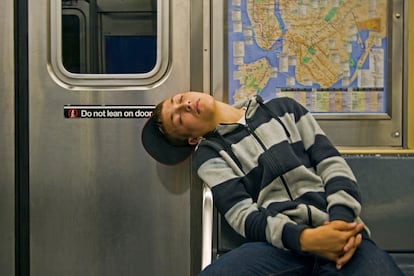Sleep is not laziness: The injustice of demanding round-the-clock availability
Several essays warn about the dangers and challenges of a sleepless society that is exhausted, desynchronized and forever on call


In the first episode of the HBO TV series Industry, Hari is an intern who wants a permanent position as a consultant at the competitive financial firm, Pierpoint & Co, in London. To achieve his goal, he consumes energy drinks and modafinil pills (a neurostimulant that causes alertness) so he can spend the nights in the office, working. Hari stays up, taking controlled micronaps every few hours in a bathroom stall. The applicant claims to be “logging those nocturnal hours, trying to make a good impression,” because he went to state school and the rest of the applicants make him feel undeserving of the position. A few weeks after starting his internship, he dies in that bathroom where he barely sleeps, collapsed from sleep deprivation and from an anxiety attack caused by a mistake he made with the font of a company report.
Hari’s story is fiction, but it is not far from reality. There are the beds that Elon Musk installed in the headquarters of Twitter after one of his workers published a photo of herself sleeping in a sleeping bag next to her desk, as well as the tycoon’s ultimatum demanding that his employees work “long hours at high intensity” and deliver an “exceptional performance.” Or the case of the Japanese advertising agency Dentsu, fined in 2017 for the suicide of Matsuri Takahashi, a 24-year-old employee who went into depression due to lack of sleep, exhaustion and overwork. She was working more than 130 hours a week when she jumped to her death from a company dormitory on Christmas Day. In one of her last tweets, she complained about having to work on the weekend again: “I want to die.”
When your team is pushing round the clock to make deadlines sometimes you #SleepWhereYouWork https://t.co/UBGKYPilbD
— Esther Crawford ✨ (@esthercrawford) November 2, 2022
The last bastion
“Sleep was the only bastion left for capitalism to colonize our lives and incorporate each of its moments into the continuous time of production, consumption and communication,” writes philosopher Marina Garcés in her essay Dormir para resistir (Sleep to Resist). In it, Garcés warns how going without sleep has become more common in modern times, where the relentless pace of production makes it impossible for someone to relax and have some downtime. “Lack of sleep has lost dangerousness and gained profitability,” says Garcés.
It’s an idea explored by art critic and essayist Jonathan Crary in his book 24/7: Late Capitalism and the Ends of Sleep. “Sleep poses the idea of a human need and interval of time that cannot be colonized and harnessed to a massive engine of profitability [...] The stunning, inconceivable reality is that nothing of value can be extracted from it,” he writes. Almost a decade later, the act of sleeping continues without being capitalized or generating revenue in the society of efficiency.
In a world where millions of people work at night and millions more claim to have trouble sleeping normally, where the implementation of remote work due to the pandemic further desynchronized society and the number of hours that freelancers and gig economy workers put in at night is impossible to estimate, the right to sleep has become a collective, social battle.
A tired population is an easily manipulated population
“No equality without equality of proper sleep,” writes Jonathan White, a professor of politics at the London School of Economics and Political Science, in his essay Poor Sleep, where he analyzes the social and political injustice that looms over a society that has normalized being always on call. The essay makes the case for establishing mechanisms of social justice that promote rest to resynchronize our circadian rhythms and our biological clock.
“A tired population is likely to be more accepting of regime types that make fewer demands on their participation,” he points out, regarding the consequences of an epidemic of chronic fatigue. “The desynchronization of sleep also reduces the overlapping free time in which people can coordinate politically. From protests to party meetings, active citizenship depends on the availability of free time that is shared, and by those not so exhausted as to seek only privacy.”
To exemplify this, he cites psychoanalyst and philosopher Erich Fromm, whose book Escape from Freedom (1941) argued that autocratic forms of politics thrive when populations are characterized by a “state of inner tiredness and resignation.” According to White, this is “characteristic of the individual in the present era even in democratic countries.”

Circadian justice
Given the political threats of sleepless societies, White criticizes the attempts to frame the right to sleep as a question of self-care. He is opposed to the experts who recommend “sleep hygiene” and prescribe going to bed at 10.00pm, arguing that this does not address the structural causes of what is a social epidemic. “Such responses tend to privatize sleep and its discontents. Holding individuals responsible for collective problems is generally a bad idea, but especially in an area like sleep, where feelings of personal responsibility generate added anxiety,” warns White.
All those measures are not enough to achieve what White calls “circadian justice.” This movement is committed to addressing the causes of short and irregular sleep, influencing labor rights by setting limits on the work week and the duration of shifts, as well as respecting the worker’s right to disconnect.
“Within the space of a mere hundred years, human beings have abandoned their biologically mandated need for adequate sleep – one that evolution spent 3,400,000 years perfecting in service of life-support functions,” writes the English scientist Mathew Walker in the book Why We Sleep. “This silent sleep loss epidemic is the greatest public health challenge we face in the 21st century in developed nations. If we wish to avoid the suffocating noose of sleep neglect, the premature death it inflicts, and the sickening health it invites, a radical shift in our personal, cultural, professional, and societal appreciation of sleep must occur,” he points out, concluding with a call to action: “it is time for us to reclaim our right to a full night of sleep, without embarrassment or the damaging stigma of laziness.”
Quite a challenge in a world that favors a work culture not unlike that of HBO’s Industry, where a character is instructed: “Don’t stay up all night... but we need to get the book to the printers by 6.00am.”
Sign up for our weekly newsletter to get more English-language news coverage from EL PAÍS USA Edition
Tu suscripción se está usando en otro dispositivo
¿Quieres añadir otro usuario a tu suscripción?
Si continúas leyendo en este dispositivo, no se podrá leer en el otro.
FlechaTu suscripción se está usando en otro dispositivo y solo puedes acceder a EL PAÍS desde un dispositivo a la vez.
Si quieres compartir tu cuenta, cambia tu suscripción a la modalidad Premium, así podrás añadir otro usuario. Cada uno accederá con su propia cuenta de email, lo que os permitirá personalizar vuestra experiencia en EL PAÍS.
¿Tienes una suscripción de empresa? Accede aquí para contratar más cuentas.
En el caso de no saber quién está usando tu cuenta, te recomendamos cambiar tu contraseña aquí.
Si decides continuar compartiendo tu cuenta, este mensaje se mostrará en tu dispositivo y en el de la otra persona que está usando tu cuenta de forma indefinida, afectando a tu experiencia de lectura. Puedes consultar aquí los términos y condiciones de la suscripción digital.








































